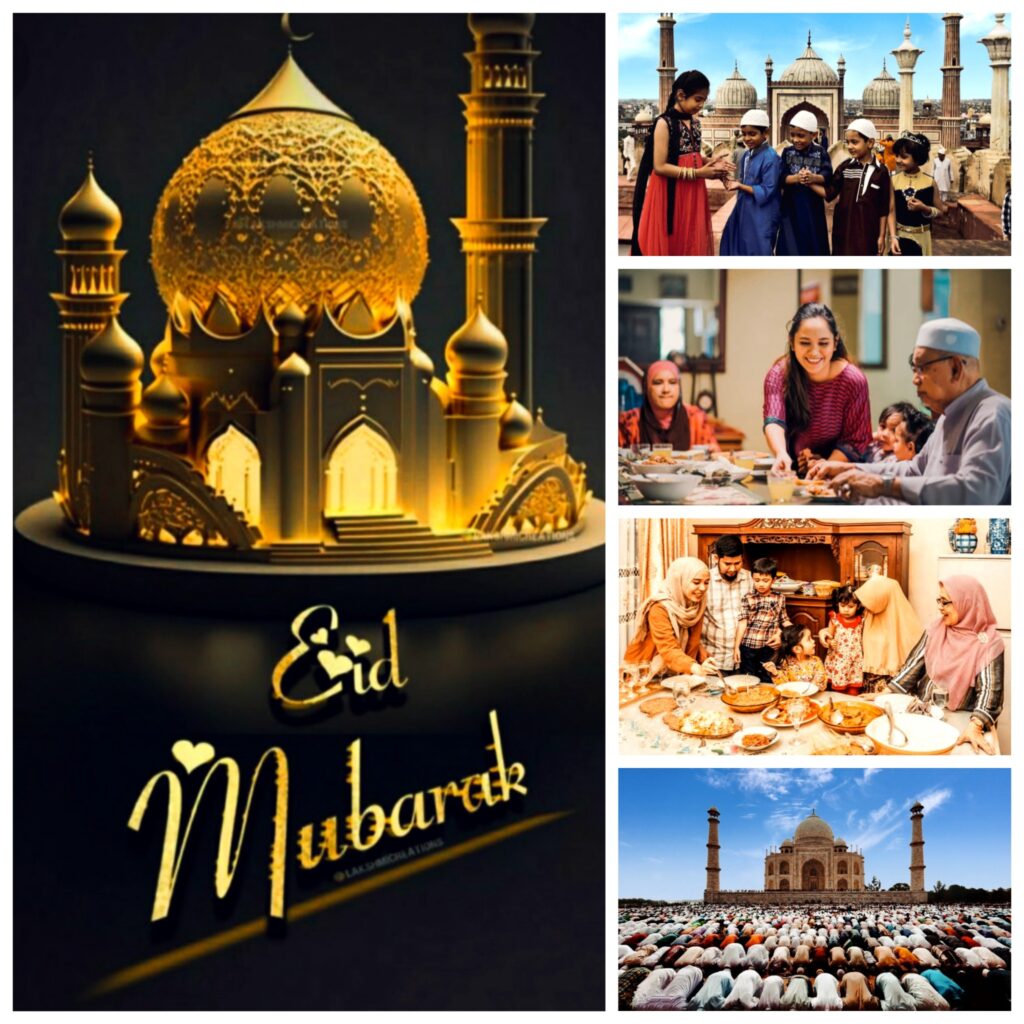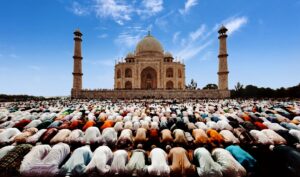Story – Manashimaya

Eid-ul-Fitr, also known as just Eid, is a global Muslim religious celebration. The Arabic phrase “Eid ul-Fitr” means “Festival of Breaking the Fast”. Celebrated on the first day of Shawwal, the month that follows Ramadan in the Islamic lunar calendar, it signifies the conclusion of Ramadan, the holy month of fasting for Muslims
Importance within the Islamic faith: In Islam, Eid ul-Fitr is a religious holiday that marks the end of Ramadan, a month-long season of fasting, prayer, and introspection. For Muslims, it is a time to rejoice, express appreciation, and find spiritual fulfillment as they commemorate the gifts that Allah (God) has showered upon them during Ramadan.
The festival also serves as an opportunity for Muslims to express unity, brotherhood, and compassion towards others, emphasizing the values of generosity, kindness, and community solidarity.
Eid ul-Fitr is considered one of the two major Islamic festivals, the other being Eid ul-Adha, and holds a special place in the hearts of Muslims worldwide as a time of spiritual renewal, celebration, and thanksgiving.
Eid-ul-Fitr is observed globally on different dates, depending on the sighting of the crescent moon, which marks the beginning of the Shawwal month, in the Islamic lunar calendar. This festival signifies the end of the month-long fasting period of Ramadan. Notably, several Islamic countries in West Asia are observing Eid-ul-Fitr on April 10, following the sighting of the Shawwal Moon in Saudi Arabia, UAE, and other regions on April 9th.

The Shahi Imam of Jama Masjid, Delhi, Syed Ahmed Bukhari, confirmed the absence of the Shawwal moon sighting. “Eid will be celebrated on Thursday, April 11,” in India, announced Bukhari. Meanwhile, regions like Jammu and Kashmir, Ladakh, and Kerala will observe Eid-ul-Fitr today, April 10, 2024.
In Islam, Eid ul-Fitr is a religious celebration that culminates in Ramadan, a holy month of fasting, prayer, and spiritual development. Muslims regard fasting throughout Ramadan as a way to deepen their religion, purify the soul, and ask Allah for forgiveness. As a result, Eid ul-Fitr has great religious significance since it marks the successful conclusion of this time of spiritual devotion and discipline.
Recalling the Last Day of Ramadan: Eid ul-Fitr is a joyful celebration marking the end of the month-long fast observed during Ramadan. It represents the satisfaction of the Islamic teachings’ requirement that fasting and refraining from worldly pleasures from sunrise to sunset be followed.
Gratitude and Spiritual Renewal Celebration: As Muslims come out of Ramadan feeling spiritually rejuvenated, purified, and closer to Allah, Eid ul-Fitr is a time for them to reflect on their spiritual journey during the month of Ramadan and express gratitude for the opportunity to engage in acts of worship, self-discipline, and charity.
During the holiday, Muslims are urged to thank Allah for his mercy and blessings, ask for forgiveness for their transgressions, and reaffirm their commitment to leading morally upright, compassionate, and religious lives.
. A major component of Eid ul-Fitr is sharing food and gifts with others, especially the less fortunate, which strengthens the community’s principles of empathy, compassion, and unity.
Historical Background: The Prophet Muhammad (peace be upon him) and his followers founded early Islamic history and customs, which are the origins of Eid ul-Fitr.
The celebration’s origins can be traced to the Prophet Muhammad, who commanded that people observe Eid-ul-Fitr to celebrate the conclusion of Ramadan and the start of Shawwal, the next month in the Islamic lunar calendar.
Hadiths and Islamic Traditions:
Several Islamic customs and Hadiths (the sayings and deeds of the Prophet Muhammad) refer to Eid ul-Fitr as a day of joy and gratitude
It is said that the Prophet Muhammad urged Muslims to celebrate Eid ul-Fitr by offering special prayers, donating alms (Zakat al-Fitr), and having joyful meals with loved ones.
The Development of Eid al-Fitr Traditions: Eid al-Fitr celebrations have changed over time to reflect regional cultures, customs, and traditions around the globe. The major traditions and customs surrounding Eid ul-Fitr, including feasting, giving, and praying, are universal, however, there may be regional variations in the particular practices.
Despite these differences, Muslims still recognize Eid ul-Fitr as a time for social celebration, thankfulness, and spiritual renewal.
Traditions and Customs Related to Eid al-Fitr Festive Mood and Preparations: Muslims make a lot of preparations in the run-up to Eid al-Fitr to create a happy and celebratory mood in their homes and communities. People buy or wear new clothes and clean and decorate their homes. Bright decorations, lights, and banners cover markets and streets, in a lively atmosphere.
Special Prayers and Sermons: Muslims congregate in mosques or public areas on the morning of Eid al-Fitr to offer special prayers known as Salat al-Eid. These prayers are followed by sermons from religious authorities that center on themes of forgiveness, gratitude, and community cohesion.
Gift-giving and Greeting-Sending: Eid ul-Fitr is a time for family, friends, and neighbors to share gifts and warm wishes. Muslims give each other presents like clothing, candies, and other signs of affection to show how much they care and appreciate one another.
Charity and Acts of Kindness As Muslims strive to share their blessings with those in need and spread joy within their communities, acts of kindness and generosity are also emphasized during Eid ul-Fitr. Zakat al-Fitr is a charity given to the less fortunate before the Eid prayers. Charity is an essential part of Eid ul-Fitr.
Customary Foods and Sweet Sweets: Depending on local traditions and cultural inclinations, traditional foods and sweet sweets are served during Eid ul-Fitr.Well-liked foods include samosas, kebabs, biryani, and desserts such as kheer, ma’amoul, and baklava.
Social Events and Celebrations: Eid ul-Fitr is a time for social events and celebrations when Muslims get together to eat together, tell stories, and spend time together.
Eid fairs, picnics, and cultural shows are examples of social events planned to promote harmony and fortify ties within the Muslim community.
